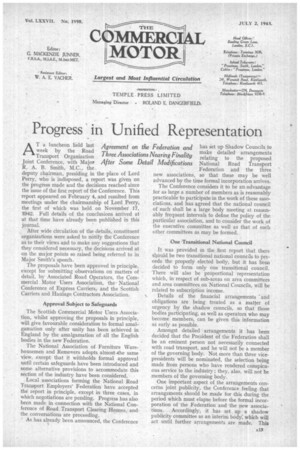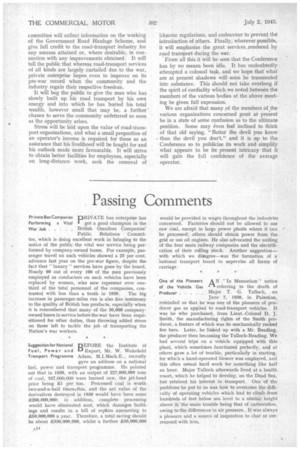Progress in Unified Representation
Page 15

Page 16

If you've noticed an error in this article please click here to report it so we can fix it.
T a luncheon held last week by the Road Transport Organization Joint Conference, with Major R. A. B. Smith, M.C., thedeputy chairman, presiding in the place of Lord Perry, who is indisposed, a report was given on the progress made and the decisions reached since the issue of the first report of the Conference. This report appeared on February 4, and resulted from meetings under the chairmanship of Lord Perry, the first of which was held on November 17, 1942. Full details of the conclusions arrived at at that time have already been published in this journal.
After wide circulation of the details, constituent organizations were asked to notify the Conference as to their views and to make any suggestions that they considered necessary, the decisions arrived at on the major points so raised being referred to in Major Smith's speech.
The proposals have been approved in principle, except for submitting observations on matters of detail, by Associated Road Operators, the Commercial Motor Users Association, theNational Conference of Express Carriers,and the Scottish Carriers and Haulage Contractors Association.
Approval Subject to Safeguards The Scottish Commercial Motor Users Association, whilst approving the proposals in principle, will give favourable consideration to formal amalgamation only after unity has been achieved in England by the amalgamation of all the English bodies in the new Federation.
The National Association of Furniture Warehousemen and Removers adopts almost -the same view, exceptthat it withholds formal approval until certain safeguards have been introduced and some alternative provisions to accommodate this section of the industry have been considered.
Local associations forming the National Road Transport Employers' Federation have accepted the report in principle, except in three cases, in which negotiations are pending. Progress has also been made in -connection with the National Conference of Road Transport Clearing Houses, and the conversations are proceeding. As has already been announced, the Conference has set up Shadow Councils to make detailed arrangements relating to the proposed National Road Transport Federation and the three new associations, so that these may be well advanced by the time formal incorporation arrives.
The Conference considers it to be an advantage for as large a number of members as is reasonably practicable to participate in the work of these associations, and has agreed that the national council of each shall be a large body meeting at reasonably frequent intervals to define the policy of the particular association, and to consider the work of the executive committee as well as that of such other committees as may be formed.
One Transitional National Council It was provided in the first report that there sljould be two transitional national councils to precede the properly elected body, but it has been decided to form only one transitional council. There will also be proportional representation which, in respect of sub-areas on area committees • and area committees on National Councils, will be • related to subscription income.
Details of the financial arrangements ' and obligations are being treated as a matter of urgency by the shadow councils, so that those bodies participating, as well as operators who may become members, can be given this information as early as possible.
Amongst detailed arrangements it has been decided that the President of the Federation shall be an eminent person not necessarily connected with toad transport, and he will not be a member of the governing body. Not more than three vicepresidents will be nominated, the selection being made from persons who have rendered conspicuous service to the industry ; they, also, will not be members of the governing body.
One important aspect of the arrangements concerns joint publicity, the Conference feeling that arrangements should be made for this during the period which must elapse before the formal incorporation of the Federation and the new associations. Accordingly, it has set up a shadow publicity committee as an interim bcicly; which will act until further arrangements are made. This committee" will collect information on the working of the Government Road Haulage Scheme, and give full credit to the road-transport industry for any success attained or, where desirable, in connection with any improvements obtained. It will tell the public that whereas road-transport services of all kinds are largely curtailed due to the war, private enterprise hopes even to improve on its pre-war record when the community and the industry regain their respective freedom.
'It will beg the public to give the man who has slowly built up his road transport by his own energy and into which he has buried his total wealth, however small that may be, a further chance to serve the community unfettered so soon as the opportunity arises.
Stress will be laid upon the value of road-transport organizations, and what a small proportion of an operator's income is required for these as an ass'urance that his livelihood will be fought for and his outlook made more favourable. It will strive to obtain better facilities for employees, especially on long-distance work, seek the removal of irksome regulations, and endeavour to prevent the introduction of others. Finally, wherever possible, it will emphasize the great services rendered by road transport during the war.
From all this it will be seen that the Conference has by no means been idle. It has undoubtedly attempted a colossal task, and we hope that what are at present shadows will soon be transmuted into substance. This should not take overlong if the spirit of 'cordiality which we noted between the members of the various bodies at the above meeting be given full expression.
We are afraid that many of the members of the various organizations concerned must at present be in a state of some confusion as to the ultimate position. Some may even feel inclined to think of that old saying, "Better the devil you know than the devil you don't," and it is up to the Conference so to publicize its work and simplify what appears to be its present intricacy that it will gain the full confidence of the average operator.




















































